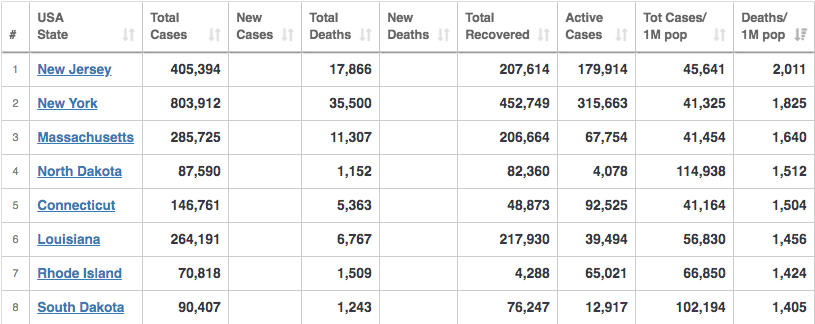1. Matt Yglesias made a very wise observation:
To me, one of the big takeaways from this pandemic has been that in a genuinely novel situation where you need to make decisions based on imperfect evidence, listening to smart generalists has been more useful than listening to credentialed subject matter experts.
That’s also my impression. Here I’m thinking of bloggers like Alex Tabarrok, Tyler Cowen and Razib Khan. When issues strongly impact society, the science no longer “speaks for itself”.
2. Tyler recently posted a tirade against bioethicists, written by one of his commenters. The amazing thing is that the list of errors is just the tip of the iceberg. There is no mention of the role that bioethicists play in the deaths of as many as 40,000 people per year due to the prohibition on selling kidneys.
3. People wonder why I suggest that there’d already be a million Covid deaths in America if there hadn’t been any social distancing. Actually, that’s probably an underestimate. To get a million dead in the US you need a fatality rate of 3000/million. New Jersey’s is now over 2000/million and still rising fast—and that’s with lots of social distancing.
New Jersey, New York and Massachusetts currently have the highest death rates (but not for long—the Dakotas are on a tear), because the disease spread widely in those states before it was recognized, and thus before social distancing.

If the US had not adopted social distancing in March, the disease would have quickly spread across the country. As we see in the Dakotas, even being thinly populated doesn’t prevent a disaster. And most of the deaths would have occurred quickly at a time when helpful treatments like steriods had not yet been proven effective and the IFR was significantly higher. Hospitals everywhere would have been as overwhelmed as in New York, indeed much worse, with no effective treatments at the time.
New Jersey likely won’t reach 3000/million dead before vaccines ride to the rescue, but it surely would have reached that level had social distancing not began in March, as would the entire country. This disease moves fast if unconstrained. Even Sweden did lots of social distancing. And the old can’t be protected in isolation; they interact too much with younger workers. The nursing homes in the Great Plains tried and failed.
[I am discussing social distancing here; none of this is a comment on lockdowns.]
4. Tyler linked to an excellent Ross Douthat column:
What separates these two parties is not necessarily ideology or partisanship or even loyalty to Donald Trump. (Nobody had Brian Kemp and Bill Barr, both prominent members of the first group, pegged as NeverTrumpers.) It’s all about power and responsibility: The Republicans behaving normally are the ones who have actual political and legal roles in the electoral process and its judicial aftermath, from secretaries of state and governors in states like Georgia and Arizona to Trump’s judicial appointees. The Republicans behaving radically are doing so in the knowledge — or at least the strong assumption — that their behavior is performative, an act of storytelling rather than lawmaking, a posture rather than a political act.
This postelection division of the Republican Party extends and deepens an important trend in American politics: The cultivation of a kind of “dreampolitik” (to steal a word from Joan Didion), a politics of partisan fantasy that so far manages to coexist with normal politics, feeding gridlock and stalemate and sometimes protest but not yet the kind of crisis anticipated by references to Weimar Germany and our Civil War.
If all the Republicans in authority are acting like the fraud charges are a joke, you can be sure that all the GOP politicians not in authority privately believe the same. But tens of millions of GOP voters really believe these nutty theories. Thus the leadership of the GOP presides over a party that is foreign to them, like Roman generals leading barbarian troops.
Perhaps Fukuyama was right after all—we are at the end of history. Both democracy and neoliberalism are deeply entrenched, and all the nonsense from the Proud Boys and the Wokesters is just performative.
Maybe there’s a sort of NIMBYism in politics, where nothing substantive can be done by either party; the special interests opposed to change are too strong. Instead, we’ll repeats all the horrors of the 20th century, the communism and fascism, but this time as mere theatre:
Tomorrow, and tomorrow, and tomorrow,
Creeps in this petty pace from day to day,
To the last syllable of recorded time;
And all our yesterdays have lighted fools
The way to dusty death. Out, out, brief candle!
Life’s but a walking shadow, a poor player,
That struts and frets his hour upon the stage,
And then is heard no more. It is a tale
Told by an idiot, full of sound and fury,
Signifying nothing.
Let’s hope so.
PS. I was reminded of Trump and the wokesters this morning when reading Schopenauer’s discussion of knightly honor:
The truth is that conduct of this kind aims, not at earning respect, but at extorting it.